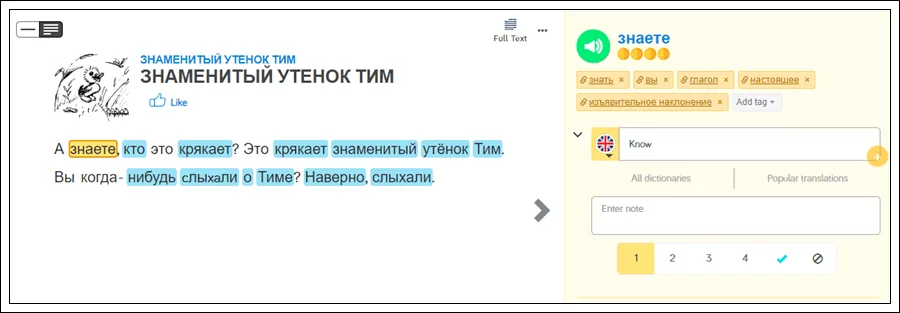Saying Hello and Goodbye in Russian
As a learner at the beginning of your Russian language journey, the first things you’re going to need to know are the Russian alphabet and how to say hello and goodbye.
You’re probably already familiar with the word Привет [pree-VYET], which can be translated into English as “hi”. However, that is not the only way to exchange greetings in Russian. Also, the usage of “privet” is much more limited than its English equivalent.
In the English-speaking world, “hi” can be used in a casual business setting, when saluting a stranger, etc. “Privet” in Russian is reserved for friends and family. In a business context, you would never use “privet”, even when you exchange emails back and forth, unless you are on informal terms with the person you are writing to.

Russian Greetings and Farewells
Let us bring into focus the ways to say hello and goodbye in Russian and shed some light on when certain greetings and farewells can be used.
Before we do, it’s necessary to brush up on basic Russian speech etiquette. As a new learner of the language you probably know that, unlike in English, Russian has a polite form for addressing a single person: Вы [vih].
Вы coincides with the plural form вы [vih] as opposed to the informal form of ты [tih]. If you know some French or German, you can draw parallels between Вы in Russian and the polite forms “vouz” in French or “sie” in German.
Due to the existence of the polite form, there is a special way to greet a stranger or a person whom you address formally using вы, a business partner or a senior person: Здравствуйте [zdrah-STVOOY-tee], which is a Russian equivalent of the word hello. The meaning of this word goes back to the end of the 17th century, and by greeting this way you actually wish a person good health.
You can use the same word to greet a group of people, irrespective of their age. To say hello to a single person whom you address informally (using ты) you can use the following two variants:
Здравствуй [ZDRAH-stvooy]
Здорово! [zda-ROH-va]
Or
Привет [pree-VYET]
All three words can be translated into English as “hi”.
Greeting Depending on the Time of the Day
Just like in English, you can say hello in Russian by referring to the time of the day when you meet a person:
Доброе утро! [DOHB-ruh-ee OO-truh] – Good morning (used until noon).
Добрый день! [DOHB- rihy dyen’] – Good afternoon (it can be used throughout the day, during the working hours and is acceptable in a business correspondence).
Добрый вечер! [DOHB-rihy VEE-cheer] – Good evening (used in the evening).
These phrases can be used in both formal and informal greetings, whether you address people using ты or вы/Вы.
Greetings and Non-Verbal Customs in Russia
Russians are rather reserved when it comes to interpersonal communication with strangers, therefore the kisses that are common in France are uncustomary in Russian speaking countries.
Very close friends or relatives kiss after having not seen each other for a long time or before a lengthy separation. Hugs have a similar symbolic meaning and should be avoided.
Handshakes are widely used by men, but in a business environment, it’s okay to shake a woman’s hand if she is your business partner. Handshaking is common as a form of greeting when you meet someone and whenever you leave.

Saying Goodbye in Russian
As is the case with Russian greetings, you can use a formal or an informal word when saying goodbye depending on the situation. The most common words that denote farewell in Russian are:
Пока [pa-KAH] – Bye – an informal way to say goodbye. Used when saying goodbye to friends and family and also anyone whom you address as ты.
До свиданья [duh svee-DAH-nee-ye] – a more formal phrase used when leaving, which means until the next meeting. You can use this phrase when saying goodbye to people whom you address as either ты or вы.
Спокойной ночи [spa-KOJ-naj NO-chee] – Good night!
Доброй ночи [DOB-raj NO-chee] – Good night!
If you want to impress a native Russian speaker with your knowledge of the language, you can also say:
До встречи! [duh VSTRIE-chi] – catch you later (or something like the French “à bientôt”).

До завтра/ до понедельника [da ZAV-tra/ da pa-ne-DEL’-ni-ka] – literally “until tomorrow” or “until Monday” – see you tomorrow/ see you on Monday.
Всего доброго! [vsivo DOH-bra-va] – all the best.
Всего хорошего! [VSE-vo ha-ROH-sheva – all the best.
Счастливо! [sche-SLEE-vah] – it literally means good luck but it denotes “bye-bye”.
Давай [da-VAJ] – it can be translated literally as “give” or “let’s” but it actually means “bye” and is often colloquially used in a telephone conversation instead of “пока”.
Or
Прощай! [prah-SCHAJ] – farewell.
You can use Прощай when leaving for a long time or forever. The etymology of this word is very peculiar. It initially denoted “forgive”, i.e. we are about to part, and I hope you forgive me and that there are no hard feelings. Over time, this meaning has been lost and people use Прощай to bid somebody adieu. It’s used to say goodbye when you think you will never see a person again, and bears a trace of sadness.
Learning Russian greetings in context
Want to find lessons where you can read, listen, and save your words? Learn Russian online using content from LingQ’s library.

LingQ (which is also available on Android and iOS) has hundreds of Russian lessons you can go through. You can also import Russian content from blogs, various websites, YouTube, and much more. For more information on how to import your favorite content into LingQ, check out this post.


